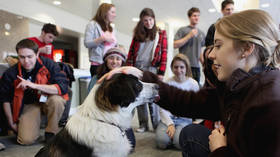Barking mad: Therapy dogs & puppy rooms are turning university students into toddlers

The increased use of de-stressing techniques at universities, such as therapy animals and playing with toys, is misguided. Students need to be able to perform under pressure or they’ll become intellectually flabby.
Is it possible for university students to succeed without having an opportunity to cuddle a dog? According to new ‘research’, the most effective way of helping struggling students to cope with their coursework is to give them a therapy dog.
Apparently, stroking a dog or an animal allows students who are “intimidated by lectures and seminars” to deal with their predicament.
In a world in which university students are increasingly regarded as unlikely to cope with the normal pressures of campus life, the provision of a therapy animal is fast becoming mandatory.
Researchers make the most ludicrous claims about the beneficial effect of cuddling animals on the performance of students. They insist that there is “objective evidence” that “soothing” sessions with therapy dogs can reduce the negative impact of stress.
The ritual of therapy dogs visiting campuses is now a normal feature of university life. For example, at Newcastle University, in Northeast England, Bessie, a three-year-old Jack Russell, has been mobilised to help students deal with mental health issues. Students are able to borrow Bessie and take her for a walk.
The provision of ‘puppy rooms’ took off a decade ago. Trinity College, in Dublin, took the decision to allow students to spend 15 minutes in the puppy room before exams. At the University of Central Lancashire, meanwhile, in Northwest England, the students’ union established a puppy room as part of its Stressed-Out Students (SOS) campaign. At Nottingham Trent University, in England’s East Midlands, the union acquired a number of miniature pigs, “allowing students to interact with the animals to relieve revision-related anxiety”.
Across the Atlantic, the rituals of stress-busting have also flourished. The University at Buffalo, in New York, placed two dozen therapy dogs at the disposal of students. They also offered activities that are “known to reduce stress”, such as knitting classes and sessions in which students could play with jigsaw puzzles and Lego.
In other American universities, pet therapy has become institutionalised throughout the year. At Emory, in Atlanta, dogs are available in its counselling centres. Meanwhile, in Massachusetts, Harvard Medical School has resident therapy dogs in its library.
What began as a silly fad is now regarded as ‘best practice’ by the educational establishment. For example, Bexhill College, in England’s East Sussex, was praised by inspectors from the governmental agency Ofsted on the grounds that its sixth-form students “benefit from the calming influence” of Harry the therapy dog.
The embrace of therapy dogs, puppy rooms and related rituals of stress-busting activities is closely linked to the institutionalisation of therapy culture in higher education.
For years, Anglo-American higher education has been in the business of systematically infantilising its students. It assumes that undergraduates are unlikely to be able to deal with the pressure of academic work without mental health support. Whereas once upon a time pressure was regarded as a creative force that stretched students and helped them realise their potential, it is now perceived as a threat to their mental health.
Universities throughout the Anglo-American world portray the transition from secondary to higher education as a variant of the psychological upheaval that primary school pupils experience when they enter high school.
A brochure targeting parents, published by the University of Tasmania, Australia, stated that the “type of support you provided for your child during earlier transitions, such as from primary to high school, is still just as important in making decisions about going to university”.
Also on rt.com Labelling every bad habit an ‘addiction’ simply means people with no self-control fail to take responsibility for their behaviourThe literature that American universities publish for parents often sounds as if they assume that potential undergraduates are simply biologically mature children.
Numerous universities offer the services of transitional counsellors, presupposing that students arriving on campus cannot cope on their own. “The counselling team are fully aware of the importance of managing transition and are here to help you find the way ahead,” claimed the counselling service of the West of England’s University of Bath. As an illustration of the kind of transitions that might require professional support, it mentioned entering university as a first-year undergraduate, the move of second-year students from campus-based residence to living in town, final-year students returning after being away on placement, and newly arrived postgraduate students. “It could be that feelings of self-confidence are quite threatened by the unfamiliarity of new surroundings and new people,” warned the service.
Not surprisingly, when young people are constantly told that they are not expected to cope on their own, they will adopt the role of a vulnerable and fragile child. The road from the puppy room leads to the quest for a safe space.
As a dog lover, I can understand why it’s fun to play with Bessie or Harry. But dog therapy will not help young people gain intellectual independence. The pressure of academic learning should not be treated as a threat to mental health. Rather, it provides a unique opportunity for students to test themselves and rise to the challenges they face. Without pressure, our students will become intellectually flabby and fearful about taking risks.
Think your friends would be interested? Share this story!
The statements, views and opinions expressed in this column are solely those of the author and do not necessarily represent those of RT.















